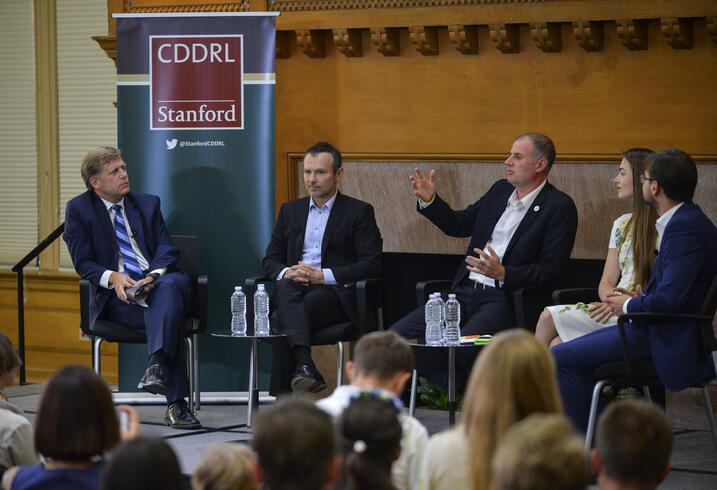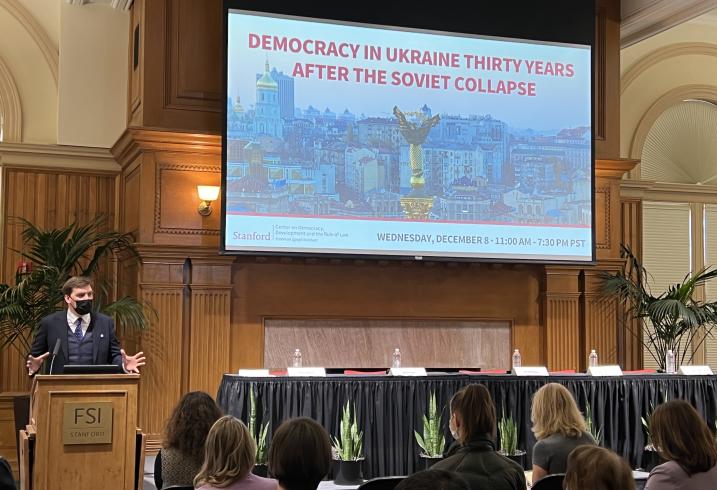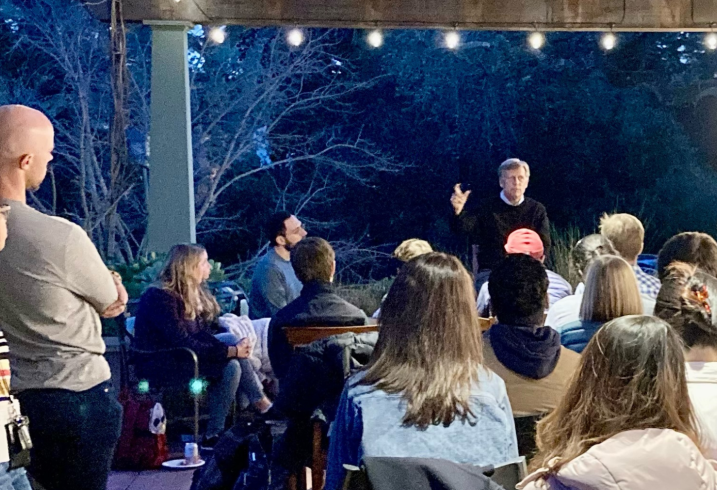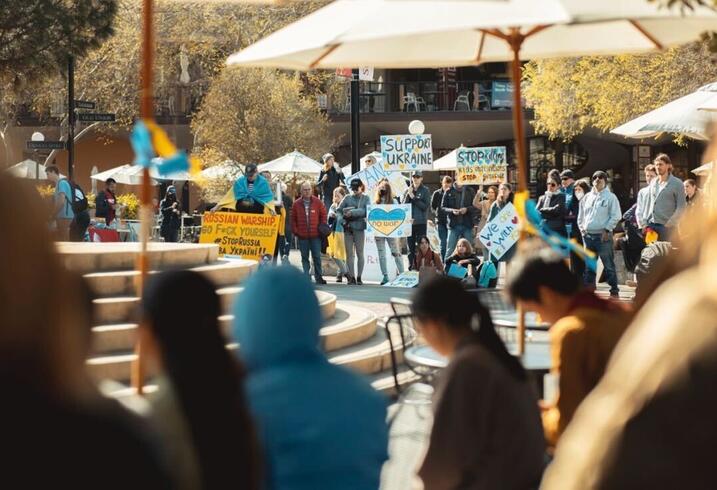Stanford Experts Explore the Roles of Taiwan and Ukraine in Countering Autocratic Challenges to Democracy
Despite their many differences, Taiwan and Ukraine have been portrayed as two fronts in a global struggle between democracy and authoritarianism. The interrelations between the two geopolitical flashpoints took center stage at the recent Yomiuri International Conference, Taiwan and Ukraine: Challenging Authoritarianism. Cohosted by APARC’s Japan Program, the Yomiuri Shimbun, and the Asia Pacific Initiative, the conference was held on January 16, 2023 at the International House of Japan (IHJ) in Tokyo. It examined paths to addressing autocratic challenges to democracy and offered recommendations for coordinated deterrence in the Indo-Pacific region by the United States and its allies.
The forum included two sessions with Freeman Spogli Institute (FSI) experts. The first session, moderated by Ken Jimbo, IHJ managing director and API president, featured panelists Oriana Skylar Mastro, FSI center fellow at APARC, and Michael McFaul, the director of FSI. They examined the fallout of the war in Ukraine, the risks of a Taiwan crisis, and their implications for security in East Asia, including Japan. The second session, moderated by Kiyoteru Tsutsui, the deputy director of APARC and director of the Japan Program, featured panelists Larry Diamond, Mosbacher Senior Fellow in Global Democracy at FSI, and Francis Fukuyama, Olivier Nomellini Senior Fellow at FSI. They considered the war in Ukraine and the tensions over Taiwan against the struggle to bolster the liberal international order.
Sign up for APARC newsletters to receive our experts' updates
Military Miscalculations, Economic Dislocations
McFaul opened the first session by reviewing some of the lessons from the war in Ukraine. The international community underestimated the Ukrainian military, he said. Putin, however, miscalculated the response of the United States and NATO, on the military side, and the scope of the sanctions the global community of democratic states, including Japan, would be willing to impose on Russia, on the economic side.
It turned out, noted McFaul, that it was possible to reduce drastically Russian oil and gas coming into Europe, and Russia today has significantly fewer resources to fight Ukraine than it had anticipated. “I think it is very important to look at just how much economic dislocation happened with Russia, a country that was not integrated into the global economic world in the same way that China is,” McFaul said. He pointed out that the international community might also be underestimating the political pressure and dislocation that will erupt if, unprovoked, China invades Taiwan. “It will have very deep economic consequences for the Chinese economy,” said McFaul.
It is important to remember that the international community did not make credible commitments to deterring Russia before 2022, McFaul noted. In the case of China, he emphasized the imperative of considering concrete ways to enhance deterrence against a Chinese invasion of Taiwan before military action begins.
Rethinking Defense and Deterrence
China, however, is not easily deterrable, as Mastro explained in her following remarks. President Xi has been clear from early on that enhancing China’s role on the international stage would be a key part of the Chinese Communist Party’s agenda. Taiwan is a top priority issue in the Chinese Communist Party’s long-term thinking, said Mastro. She reminded the audience that at the recent CCP Congress, President Xi reaffirmed that China will not rule out using force to bring Taiwan under its control. He also elevated Party members with extensive expertise in the joint operational domain and with Taiwan contingencies to the Central Military Commission, the Chinese top decision-making body for military affairs.
How, then should the United States and its allies approach the question of deterring China? Mastro emphasized three conditions that U.S and Japanese defense policy must meet.
First, whatever the United States and Japan do in the defense realm must have an operational impact. For example, U.S. carriers will do nothing to prevent China from taking Taiwan in a wartime scenario, Mastro argued. “And along those lines, from the Japanese point of view, enhancing defense of the Senkaku Islands does nothing to deter China from taking Taiwan unless Japanese operations are going to be involved directly in stopping a Chinese invasion of Taiwan.”
The second condition is that China has to know about any defense changes the U.S. and its allies are making. For instance, if, in peacetime, there is no indication that the Japanese military is engaging in Taiwan Strait transits with the United States and the Chinese do not know about such activities, then they do not enhance deterrence.
Third, deterrence must happen before a war starts. It may seem an obvious point, but if the prevalent view is that, for example, the Japanese public will support the United States once a conflict over Taiwan erupts, then this approach does not deter China. “We have to let the Chinese know now that there is such support,” Mastro stated.
One issue China is concerned about, Mastro noted, is widening a Taiwan contingency. “China only wins Taiwan if the war is short, geographically limited to Taiwan, and only involves the United States, potentially in Taiwan,” she explained. “So I am convinced that if Japan were to commit to fighting with the United States in this contingency, that would be enough to deter China.”
Ultimately, the question before the United States and its allies is: “Do we want a happy China that is undeterred or an unhappy China that's deterred,” Mastro concluded. “Those are our only two options.” Deterrence is expensive and requires tradeoffs, but one thing that is costlier than deterrence is a major war, she emphasized.
“Let’s start thinking about how to actually change the environment with the sense of urgency that we need, because my biggest fear is that we're going to find ourselves in a major war with massive cost,” she urged the audience. There will be sacrifices to make, but the alternative, in Mastro's view, is worse.
Opportunities and Perils for Democracy
In the second session of the conference, panelists Larry Diamond and Francis Fukuyama examined the war in Ukraine and the tensions over Taiwan from the lens of democratic decline and its implications for the liberal international order.
Democracy has been in a global recession for most of the last two decades, yet the picture is not as bleak for democracies as it was just two or three years ago, said Diamond. In the United States, reforms at the state level have occurred, election deniers took control of Congress seats by a much smaller margin than predicted before the 2022 midterms, and extreme election deniers in crucial swing states were virtually defeated. Meanwhile, on the international stage, 2022 spotlighted autocrats’ inevitable shortcomings. In Russia, Putin has catastrophically miscalculated the war in Ukraine. In China, Xi has massively mismanaged the COVID pandemic, and the country’s economic growth is severely impaired.
Fukuyama said he was encouraged by the democratic solidarity shown in response to the war in Ukraine, especially in Europe, within NATO, and in Japan. Germany’s and Japan’s decisions to increase their defense budgets have been remarkably reassuring signals of strength among democracies, he noted.
But we sometimes forget that many countries in the Global South and elsewhere do not buy into this narrative, cautioned Fukuyama. Among the big disappointments in this regard is India, he stated, which raises the question of whether the issue at stake is indeed a battle between democracy and authoritarianism.
Indeed, democracies still face intractable challenges, Diamond explained. These include the corrupting influence of dirty money around the world, the trends of de-industrialization and hollowing out of the working class in advanced democracies, and social media, which Diamond sees as the single biggest driver of democratic decline. “I cannot tell you how much damage social media has done to destroy the social fabric of Truth and credibility and polarize society into tribal camps who don't have the same facts,” he said. “We have not found a way to temper that impact and win the battle For Truth.”
Taiwan and Deterrence
When it comes to the question of Taiwan, Diamond says he is worried. “There is going to be a PRC military invasion of Taiwan, probably in this decade, unless it is deterred,” he said. The three most crucial actors in deterring China are Taiwan, the United States, and Japan, he explained. Successful deterrence must involve coordination among all three in multiple arenas — from military cooperation to increased defense capacity and preparedness to impose such heavy costs in response to a Chinese invading force that will change Xi’s calculus.
Diamond observed that democracy is about uncertainty, of which there is now plenty in Taiwan as it looks ahead to a January 2024 contentious presidential election. Diamond’s prediction is that "China will intervene however it thinks it can” in Taiwan’s upcoming presidential election, as Xi would certainly prefer to pick up the island peacefully than by force, he said. “I think it's going to be very important that the people of Taiwan see that they're not alone, that the democracies of the world — not just the United States and Japan but Australia and Europe — are with them; it will increase their will to fight.”
Media Coverage
The Yomiuri ShimbunRead More
At the Yomiuri International Conference, Freeman Spogli Institute scholars Larry Diamond, Francis Fukuyama, Oriana Skylar Mastro, Michael McFaul, and Kiyoteru Tsutsui examined lessons from the war in Ukraine, the risks of a crisis over Taiwan, and the impacts of both geopolitical flashpoints for defending democracy and for a coordinated approach to deterrence in the Indo-Pacific.










































